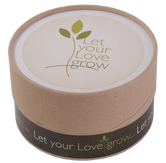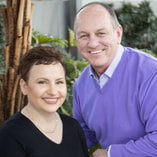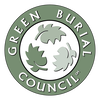The Care and Feeding of Earth: New research yields nurturing disposition products and processes4/14/2019
 by Bob and Annette Jenkins, and David Carter, PhD. The most valuable experiences in life are transcendent. Experiences like love, respect, and humor transcend political, economic, and social boundaries. Life itself transcends these boundaries as all manner of organisms exist on our planet. Elements, water, and energy combine to become life. Death allows decomposition to break them apart for repurposing into new life. Humans, as stewards of Earth, are obligated to optimize the health of our planet and its inhabitants. As a funeral director, I’ve seen firsthand the need for solutions to the way we have been handling the physical remains of our loved ones in the modern era. When Annette and I founded Verde Products, Inc. in 2009, we dedicated our lives to research and experimentation that would lead to developing disposition products that would contribute to improving the circle of life and death through efficient and beneficial decomposition on this planet. Our long-term goal is to develop evidence-based practices for the safe and clean disposition of remains that can be used anywhere in the world. Conventional burial and cremation inhibit decomposition and the natural maintenance of our atmosphere and ecosystems. They either prevent decomposition (conventional burial) or release virtually all elements directly into the atmosphere (cremation). These negative effects are further compounded because the expansion of conventional burial ground eliminates space that could be inhabited by plant and microbial communities. Additionally, cremation consumes vast amounts of energy that further impacts our planet’s ability to maintain healthy ecosystems. Our research is founded in sustainability and environmental quality. All living organisms contain carbon and nutrients, such as nitrogen, phosphorus, and potassium, that are crucial for life on Earth. In green burial, these elements are recycled after death via natural decomposition to generate new life and maintain our atmosphere. Human and animal remains are no exception. Unfortunately, green burial has not been the norm for a very long time. What exactly are we up against? Let’s take a look at the 1.4 million and 1.3 million decedents who underwent cremation and conventional burial, respectively, in the USA in 2017. If we assume that, on average, each of these decedents weighs 110 pounds (50 kg) this means that the following elements were prevented from decomposing:
This presents significant problems for the responsible management of our planet. All of these elements are critical to life on Earth. Locking them away via embalming and releasing them into the atmosphere via cremation prevents them from following their natural cycles where they are decomposed by microorganisms, animals, and plants. Conventional burial consumes space that could be inhabited by microbes and plants, organisms that are crucial for decomposition and environmental health. Allowing these decedents to decompose naturally returns elements, water, and energy to the Earth. And cremation releases significant chemicals into the atmosphere. Some of these chemicals, like carbon dioxide, contribute to global climate change. Our mission in developing products that enhance the decomposition process are threefold:
Our ultimate goal is to provide an opportunity to conduct landmark research that is foundational to public health and environmental health. Significant potential exists to improve the funeral industry beyond current practice by making existing facilities operate more efficiently and effectively. In doing so, we will lessen the negative carbon and nutrient footprints that are formed by conventional practices. The leading edge research we are conducting will aid us all in understanding the environmental impact of disposing human and animal remains as well as cremated remains, maintain and promote respect for all cultures and belief systems, and offer new, sustainable revenue streams to the funeral industry, particularly in regions where space is a limiting factor. Green burial is not a new concept. However, over time, new risks and challenges have unfolded as the practice has reached global awareness. The consequences of returning to natural green burial must be fully understood. Products and practices have been introduced with little or no scientific evidence of environmental impact. Today with so many known and unknown diseases, as stewards of Mother Earth, we need to have science-based results of the impact and the long-term effects. Without exception, harmony and balance with nature must be maintained to continue the natural flow of energy for our planet.  Bob and Annette Jenkins are the founders and owners of Verde Products Inc. and Let Your Love Grow. They created Let Your Love Grow as a result of their need to pay tribute to their beloved dachshund Silke. Let Your Love Grow is an organic mixture that blends with cremated ashes to create a nutrient-rich soil. The company will be releasing a burial product in 2019 that will efficiently advance decomposition and be beneficial to the environment to maintain balance with Mother Nature. To learn more about Verde Products, Inc., and Let Your Love Grow go to https://www.letyourlovegrow.com  David Carter, PhD, is the Director and Professor of Forensic Sciences and Assistant Dean of Natural Sciences and Mathematics at Chaminade University of Honolulu. Dr. Carter possesses extensive global experience with the decomposition of remains, in forensic, funerary, and natural settings. He is particularly interested in the microorganisms associated with decomposition, as they play a crucial role in the decomposition and recycling of remains. Ultimately, Dr. Carter is interested in establishing environmentally sustainable approaches for the respectful disposition of remains and feels that these approaches should be designed to promote public health, biodiversity, and responsible land management. Dr. Carter is widely respected in his field and is an extremely valuable asset to our ongoing research.
Karen
4/17/2019 03:40:33 pm
Interesting. It sounds like a viable option to the traditional funeral. I don’t like the idea of embalming and am not enamored of cremation. They are costly and the survivors’, in their grief-stricken state, often spend more than they can afford. I do appreciate the thought of natural burials. Seems positive for everyone. 3/16/2020 03:39:10 am
This is a great news for all of us! This is an example of positive green burial movement and a lot of help to the mother earth. Comments are closed.
|
Call for EntriesWe welcome original content with unique perspectives for the GBC Blog, preferably not previously published. The views and opinions expressed on the GBC Blog are those of the authors and do not necessarily reflect the official position or policies of the GBC. Submit entries by email Archives
February 2024
|
 RSS Feed
RSS Feed

